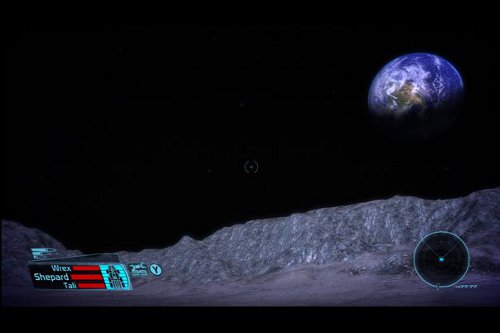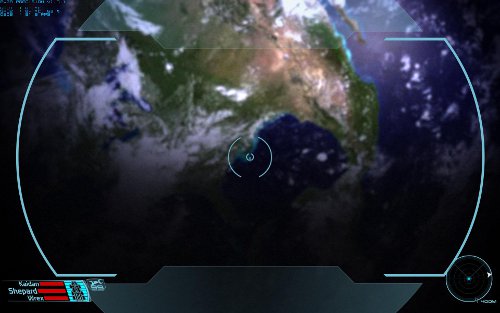home // text // multi-media // misc // info
video-games game-design astronomy Mass Effect: Bad Astronomy Pun
I really don’t want to say this… but I have to now.
I didn’t jump on the Mass Effect bandwagon right away, because—despite BioWare’s fabulous track record and what I assume must have been their best intentions—I feared another generic triple-A space marine shoot-em-up. As it so happened though, a friend lent me both Mass Effect and another generic triple-A space marine shoot-em-up for the X360 right around the Christmas break; and while the latter really hasn’t appealed to me, Mass Effect, it would seem, has. And that’s despite the glaring UI flaws.
I won’t discuss game design here, as not only has it all been said, but clearly the game has been successful enough to warrant a sequel, with a third instalment already scheduled for the end of this year.
And I’m not here to get overly scientific and pedantic on a video game, as I’m still rather more proud of the number I did on Call of Duty 4: Modern Warfare 2.
[EDIT: Erm…okay, I underestimated.]
Still, there remain a handful of nits I feel morally obliged to pick. Piecemeal:
Astrocartography and Astrogeology
I really dig the galaxy map. Hell, I just like flying around and surveying planets and random asteroids. I don’t know who BioWare got to write up their planetary descriptions, but this person did their homework. Each world (of the several dozen or so) comes with a description of its atmospheric composition, orbital period, mean distance, gravity, and other details on which astronomy geeks like myself get off. It all gives the sense of a very real and rich selection of planets to visit…
…until one actually visits them. It’s only a small fraction of the galaxy’s planets on which events and missions take place, but for the most part, each one “feels” like every other, with a slightly different ground texture and/or weather effect. I won’t complain about gravity being the same everywhere (well, not yet), as it would make sense that colonists and corporations (at least, human ones) would seek out Earth-like planets on which to operate. So hey, no real problems here, besides the palette-swap between planets.
Star Trek-itis
I’ll come right out and say it: I believe in extra-terrestrials. I don’t presume they’re the type that journeyed billions of interstellar kilometres simply to, well, probe the mid-west, but I imagine that—statistically—it’s probable that life exists “out there,” and that a subset of that life would probably sip tea and be what we call “civilised” and/or military expansionists. But take a minute or two and look at eight bioluminescent sea creatures from right here on Earth. Most of those things freak me out in a very primordial way; if we can find that kind of novelty just looking at eight species of the millions that inhabit our own planet, I very much doubt we’ll one day find ourselves part of Star Trek’s rich bestiary of interstellar, bilaterally-symmetrical and bipedal creatures. Modulo this thing, I guess.
Regardless, kvetching about “human-like” aliens is a pretty tired old complaint. It’s a standard conceit. You can go about your business, move along.
Luna
In twist that I honestly wasn’t expecting (not a spoiler, just a nice surprise): the player can visit the system of Sol. After having spent a few hours roaming and surveying and reading about alien worlds, here I was, looking down on our little Solar system in the game’s galaxy map, each planet (and one dwarf planet) given its share of screen time. It was almost surreal, in a way. Lovely.
One of the missions in the Sol system takes you to Luna—our own little basaltic satellite, humanity’s first stepping-stone into the Cosmos. How exciting! I could finally recreate Buzz Aldrin’s stepping all over the Moon, but this time with (more) guns! I quickly abandoned the main storyline quests and made a few small, tentative steps onto the Moon. As briefly as possible:
Sound on the Moon
Hey, maybe there’s a training base on the Moon with a crazy Virtual Intelligence that wants to kill all humans. And hey maybe it wants to shoot rockets at me. But no, I shouldn’t hear the rockets whizzing by me. There’s no air on the Moon. It doesn’t work like that. Stop it.
Doing the Moonwalk
Shepard can run on the Moon. As fast as on the Citadel. As fast as on the Normandy. Frankly, no. Really, no, not at all. I’m willing to concede that the various planets colonised and used by humans of the future will likely be of near-Earth gravity. But unless humanity decides to back-fill the Moon with enough mass in its tiny frame to generate Earth-like gravity, this is just silly.
But hey, that gives me an idea! A SCIENCE IDEA! Suppose we give BioWare the benefit of the doubt. Let’s suppose the Moon does have enough mass to generate 1G—the same force of gravity on its surface as experienced by an average human at an average height on Earth.
Where do we begin? Ah yes. Now I, being monumentally average in most respects, am a svelte 80kg. Knowing my own mass, we can use my Internet namesake’s Universal Law of Gravitation, as well as the gravitational constant and the Earth’s average radius of 6,378km (6,378,000m) to calculate the force that keeps me on Terra Firma. Calculations aside: Mr. newton64 feels roughly 784.5 Newtons of gravitational force, on average, at an average height on Earth.
Now let’s try that formula for gravitation once again—with a twist! I want to feel the same gravitational force (F=784.5N) on the Moon as I do on Earth. Using the same values above for the gravitational constant, for my mass, and substituting the radius of the Moon (1737.4km, or 1,737,400m), we can rearrange variables and solve for the mass of Luna herself! Mathemagics: the Moon must have a mass of 4.03x1025kg 4.44x1023 [EDIT: See the comments below – mea culpa, I made a math error!] to create that kind of gravitational pull on me. This in contrast to the 7.36x1022kg that the Moon actually, well, has.
So the Moon, according to BioWare, is 1,000 times more massive than we’re used to, to allow Shepard to prance about upon its surface. With this mass of 4.03x1025kg and known volume of 21.9x1019m3, we can calculate the supposed density of the Moon to be 184,018kg/m3. This is, I should point out, greater than the density of matter at the core of the Sun.
So, again: no.
What is this i don’t even
In writing the long diatribe above, I almost forgot the main event. While walking about on the surface of the Moon, this is a typical view:

A small aside: Neil Armstrong is famously quoted as saying “I put up my thumb and shut one eye, and my thumb blotted out the planet Earth. I didn’t feel like a giant. I felt very, very small.” Somehow, the proportions of the Earth in this skybox just don’t seem right. Calculating the Earth-Moon distance as suggested by this screenshot is left as an exercise to the reader.
Now, I’ll say nothing of the bland, repeating textures on the lunar surface, and nothing of the creative and geologically implausible (impossible?) level map provided. What really interests me is the close-up of the Earth:

Look very closely. Note Florida, Mexico, and the Yucatan peninsula.
I’m too tired to say anything but “Wow.” BioWare, you’re a bunch of plucky little charmers, but I think on this one I’m going to have to go with my gut instinct and say that you can’t just up and flip a continent. These things take time.
Is the mirroring of the Earth’s geology attributable to the Moon’s apparent, thousand-fold weight gain? If so, it would be one hell of a mass effect indeed.
A big Le Sigh
NASA recently released Moonbase: Alpha for free on an unsuspecting public. Although it won’t win any Game of the Year prizes, and while it’s something like the first of its kind, it nevertheless gets a few things right about space travel; in particular, the experience of moving about on the Moon. And on the other hand, Mass Effect is a big-budget, triple-A title from a company with wonderful game design credentials.
Somewhere between the two lies an intersection of game design and basic scientific principles. Yes, scientific realism can be agonisingly boring. Yes, I can suspend my disbelief when it comes to alien cultures and worlds. But when it comes to the Moon—literally as close to home as you can get in the game—I expect at least some measure of believability. I have no idea what astronomical wonders await me in Mass Effect 2 or its upcoming sequel; I can only hope I’m pleasantly surprised. Or perhaps, less unpleasantly surprised.
Angry, pedantic, petty internet nerd, signing off.